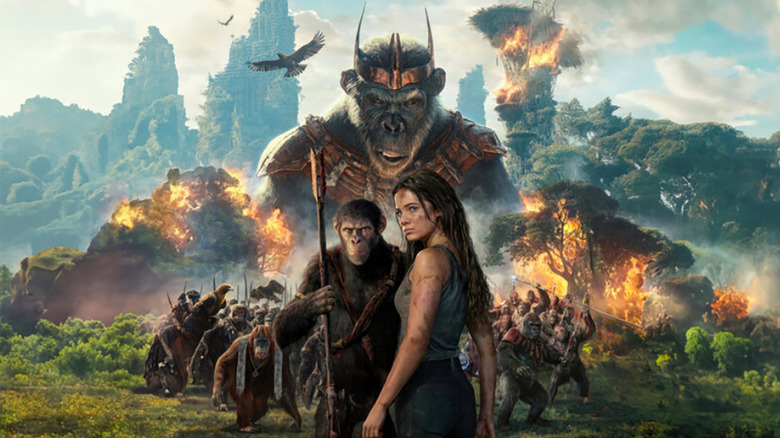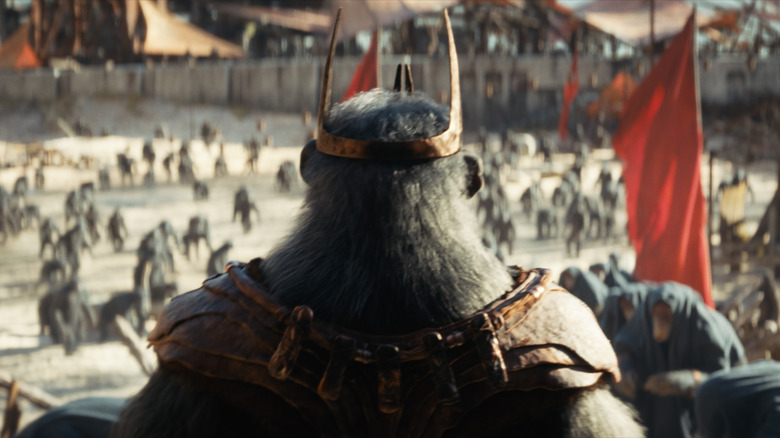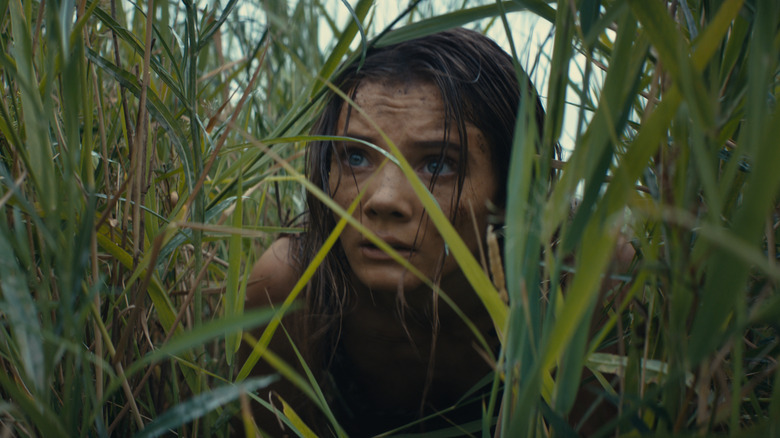Kingdom Of The Planet Of The Apes' Real Villain Is Hiding In Plain Sight
The post contains major spoilers for "Kingdom of the Planet of the Apes."
After a seven-year break, the "Planet of the Apes" franchise has finally returned with a new installment, one that takes us much further than seven years into the future. Director Wes Ball's "Kingdom of the Planet of the Apes" takes place centuries after the Caesar trilogy in the overall timeline, with apes now firmly the dominant species on the planet. So yes, there is a new ape villain at the center of the proceedings in the form of Proximus Caesar (played by Kevin Durand). However, the film's real villain was hidden pretty well in the marketing — even though right there the whole time.
The film sees Noa (Owen Teague) seeking out the sect of apes led by Proximus, who annihilated his home, killed his father, and kidnapped Noa's clan. Along the way, he and his new pal Raka (Peter Macon) encounter a human (Freya Allan) who is smarter than the other Echoes, as Noa's clan calls them. She follows them on their journey for a while before Noa and Raka learn just how smart she is. This human can talk, and she even has a name, which is Mae. They form a slightly uneasy alliance. Largely thanks to Raka sharing the teachings of Caesar — albeit a little skewed over the hundreds of years since his passing — Noa ends up coming around to Mae and, more broadly, the idea that humans aren't all bad. Unfortunately, Noa soon learns that apes are probably better off not trusting humans after all.
In a third-act twist, after they break into a massive cliffside vault that Proximus is thirsting after, Mae steals a mysterious hard drive, hides a gun, and sabotages Noa's rescue efforts to serve her needs. She breaks Proximus' seaside dam, despite the danger it poses to Noa and his clan, and drowns the vault, killing quite a few apes along the way. Yes, there is a big showdown between Noa and Proximus to bring us home, but Mae proves to be the true villain underneath it all. Apes and humans will be at war once again, it seems.
A clever bait-and-switch with Proximus Caesar
The Caesar trilogy was a brilliant execution of man vs. nature as a concept, but by the end of director Matt Reeves' "War for the Planet of the Apes," it was pretty clear that humanity's days were all but numbered. Generations removed, humans are more of a legend, and most surviving on land are more primitive, with no ability to speak. Even though we don't dive super deep into Mae's upbringing or the society she was raised in, we learn by the end of the movie that there are, indeed, many smart, speaking humans who know the ways of the old world. They've been living underground for years, waiting for the chance to bring humanity's glory days back.
Yet, the marketing of "Kingdom" leaned heavily on the idea of this being more of an ape-forward movie, with Proximus serving as a compelling, non-human villain. That left audiences (myself included) not even looking for a twist. We weren't necessarily looking for a human villain. And credit to Allan, who delivers one heck of a performance to throw us off the scent for much of the movie. Not for nothing, but Proximus ends up being an even better bad guy, because much like Magneto in the "X-Men" franchise, he has a point. Mae makes his point for him.
The ending of "Kingdom of the Planet of the Apes" hits hard at an old idea: war will never stop. The apes lived long enough to find reasons to war with one another, with religious extremism and the bastardizing of old ideas leading to a splintering within the society they had worked generations to create. That's the brilliance of Proximus, who was very much inspired by Julius Caesar as a great conqueror. But there is no better conqueror than humans and no greater evil than humanity.
Humanity is once again the villain in Planet of the Apes
Mae is not a mustache-twirling sort of evil. She just understands what humanity used to be, and seeing what they've been reduced to, it's not hard to sympathize with her desire for the old world. But it's also easy to see Noa's frustration when she says that what humanity built isn't for apes. Generations can't undo all of that bitterness, in spite of the fact that mankind, ultimately, was its own undoing. We also can't ignore Mae showing up to Noa's home, cautiously ready to shoot him dead before their final conversation unfolds. There is a feverish dedication to humanity's cause at her core.
/Film's BJ Colangelo spoke with Wes Ball about "Kingdom of the Planet of the Apes," and he touched on what happens with Mae in the end. As grim as it seems in the film's closing minutes, the filmmaker has an optimistic take on where she winds up:
"They are responsible for where this world ultimately ended up. But I think what's interesting about her role is that she changes almost to become more optimistic and hopeful by the end. He offers peace, and she takes it with her to her world. So it's interesting that she starts in a dark place and ends in a place of [optimism]. The dynamic and relationship that forms between these two characters, as complicated as it is, as it becomes, is going to be crucial moving forward."
Will Mae's complicated sympathy for Noa be enough to save the apes from a reunited group of humans? Will Mae's desire to see humans reclaim what they once had overrule her reluctant acceptance of Noa's peace offering? The questions we're left with only serve to make this villain turn for Mae all the more compelling.
"Kingdom of the Planet of the Apes" is in theaters now.


